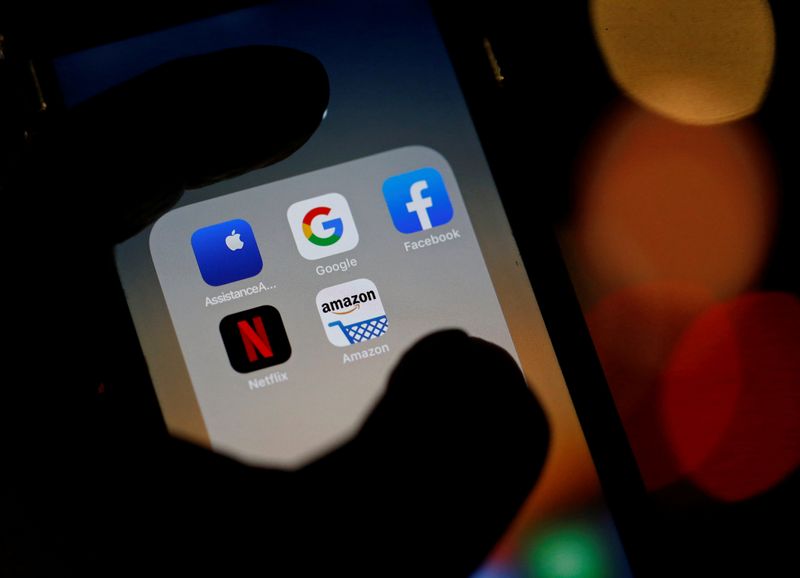This post was originally published on this site
https://i-invdn-com.akamaized.net/trkd-images/LYNXNPEG3K0QQ_L.jpg
NEW YORK (Reuters) – Investors are once again crowding into a narrow range of technology and internet stocks, heightening concerns that the market’s dramatic bounce from last month’s lows is becoming increasingly vulnerable to sharp reversals as the coronavirus outbreak continues to batter the economy.
Just five stocks – Microsoft (NASDAQ:MSFT), Apple (NASDAQ:AAPL), Amazon (NASDAQ:AMZN), Google parent Alphabet (NASDAQ:GOOGL) and Facebook (NASDAQ:FB) – account for more than 20% of the market cap of the entire S&P 500 index, according to BofA Global Research. That’s a greater concentration in the top stocks than was seen during the dotcom bubble of 2000, analysts at the bank wrote.
The information technology sector carried a 25.4% weighting in the S&P 500 as of Friday, far more than the other 10 major sectors and slightly more than its weighting on Feb. 19, when the benchmark index hit its all-time high.
Strong balance sheets and business models that appear likely to weather the fallout from the outbreak have made these companies appealing destinations during the severe volatility of the past several months.
But a top-heavy market is also a worrisome sign to some investors – especially as concerns grow that the S&P’s 26% rally from its March lows have put it far ahead of economic fundamentals at a time when the United States continues to shed jobs at a record pace and corporate earnings are deteriorating.
The index’s narrow leadership may also be an indication that investors are skeptical that other areas of the market will fare well in coming months. At the same time, a turn lower in stocks could cause investors to bail out of winning shares to lock in their gains, leading to even steeper declines.
“If the market decides it is going to roll back over again and head back down to retest those lows, then people are going to take profits where the profits are greatest,” said Liz Ann Sonders, chief investment strategist at Charles Schwab (NYSE:SCHW).
Amazon, Microsoft and Netflix (NASDAQ:NFLX) have been the greatest contributors to the S&P 500’s total shareholder return so far this year, as of Friday, according to Howard Silverblatt, senior index analyst at S&P Dow Jones Indices.
Netflix shares have climbed 35% so far in 2020, Amazon has risen nearly 30%, while Microsoft is up 11%.
Graphic – Tech, Internet stocks take charge: https://fingfx.thomsonreuters.com/gfx/editorcharts/qmyvmllbpra/eikon.png
Meanwhile, an analysis by research firm Bernstein showed technology and internet names among the market’s most widely owned stocks. The market’s five most crowded stocks are Microsoft, Amazon, Alphabet, Visa (NYSE:V) and UnitedHealth (NYSE:UNH), according to Bernstein’s analysis, which uses factors such as institutional ownership and price momentum.
“You have a market that was narrow back in February and too concentrated in technology. Now it’s even more so,” said Matt Maley, chief market strategist at Miller Tabak.
“There’s a reason why this happens when the market is vulnerable, because people don’t see a lot of value in the overall market, so they go into the small number of names they do see a lot of value in,” Maley said.
Investors are watching for signs of equity weakness as other markets, such as oil which saw prices turn negative on Monday, are showing stress. Short bets against the SPDR S&P 500 ETF Trust rose last week to their highest level in data dating back to January 2016, according to financial analytics firm S3 Partners.
The appeal of tech and other internet companies makes sense to some investors, especially with an uncertain market and economic outlook.
“For a lot of folks, any growth is still going to be in the tech space, so it continues to argue for putting money into those stocks because growth is going to be at a premium,” said Chuck Carlson, chief executive officer at Horizon Investment Services in Hammond, Indiana.
And while tech has outperformed the overall market, stocks in some other areas also have held up well, especially in healthcare and consumer staples, two traditionally defensive sectors.
“Technology has never been considered a ‘defensive’ sector, but maybe it should be considering how well it has performed during a global pandemic,” Bespoke Investment Group said in a report.

